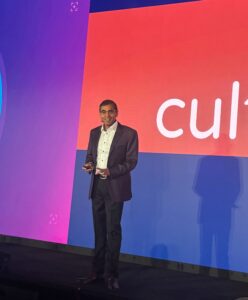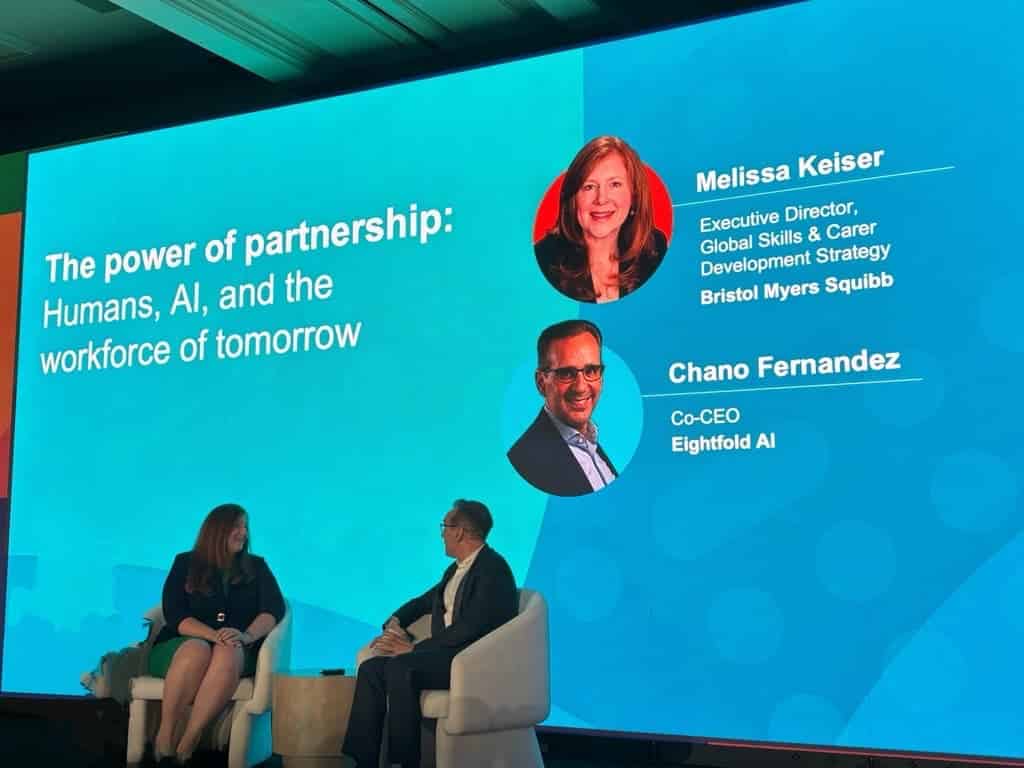To appreciate the transformative potential of the intersection of agentic AI and talent strategy, look no further than a recent gathering of customers and employees of the talent intelligence platform Eightfold AI.
At the company’s Cultivate Talent Summit, HR leaders and talent executives came together to discuss their pivotal role in the emerging era of agentic AI. The summit focused on practical strategies for HR professionals driving AI-powered transformation across talent acquisition, development and workforce planning.
Understanding agentic AI in HR
According to Eightfold leaders, agentic AI refers to systems that can make decisions, take initiative and adapt to new information without constant human oversight in order to achieve specific goals. Adoption of this technology is accelerating rapidly, with PwC projecting that AI—agentic forms included—will contribute $15.7 trillion to the global economy by 2030.
CHROs are expected to play a critical role in delivering that value. “HR has to lead this transformation from the front,” said Chano Fernandez, Eightfold’s co-CEO. As agentic AI rapidly becomes mainstream, HR leaders have a unique opportunity to fundamentally rethink how work is organized and how talent moves through their organizations. This involves leveraging the technology and guiding employees through the change management needed to work alongside AI agents.
AI solutions for talent acquisition
This opportunity comes amid significant challenges. According to Deloitte’s 2025 Global Human Capital Trends report, 66% of managers and executives say recent hires are not fully prepared to meet job expectations—primarily due to a lack of experience. Deloitte notes that the talent gap is widening as automation and AI eliminate many entry-level roles while competition for qualified candidates intensifies.
Eightfold founder and co-CEO Ashutosh Garg acknowledged a fundamental disconnect between the need for qualified talent and recruiting teams’ capacity to evaluate every candidate. “We cannot interview everyone,” he said. To address this, Eightfold introduced its AI Interviewer Agent, which autonomously engages candidates through conversational interactions to assess them in real time.
Garg pointed out how difficult it is for workers to carve out time for traditional, lengthy interview processes. Available 24/7, the AI Interviewer connects with candidates when it’s most convenient for them while also relieving time pressure on recruiting teams.
According to Eightfold, agentic AI brings several key benefits to recruiting. It reduces bias by standardizing evaluations, supports more objective assessments of technical skills and enhances scalability—allowing companies to efficiently screen large applicant pools. It also ensures consistency by delivering every candidate a structured and uniform experience.
Read more: Rooting out personality bias in the hiring process
Preparing organizations for AI transformation
What makes an organization ready for this new era? According to Rimple Patel, Eightfold’s chief customer officer, readiness involves more than just adapting to change—it requires actively shaping it. “A world that does not stand still,” she said, demands agility and continuous transformation.
Melissa Keiser, executive director of global skills career development strategy at Bristol Myers Squibb, emphasized that HR’s responsibility is expanding beyond hiring to designing systems for long-term career growth. “The ROI is there,” she said, when organizations use AI to solve real problems and apply harmonized data to better understand workforce dynamics.
“You always learn lessons in this space,” she added. “Don’t wait for perfection.” Her advice underscored the importance of beginning the transformation now rather than waiting for ideal conditions.
Read more: How HR can tackle 3 top AI-related tensions in the workplace
The rise of digital twins
One of the most groundbreaking announcements at the Cultivate Summit was the introduction of Eightfold’s Digital Twin. This new solution aims to modernize how organizations understand and support their people by connecting enterprise work systems to build a holistic picture of each employee’s contributions—capturing their decisions, relationships and accumulated expertise over time.

The Digital Twin is described as a personalized large language model (LLM) that synthesizes each employee’s knowledge, skills and experience. By integrating across platforms like email, Slack, Teams, CRMs, project management tools and code repositories, it helps capture and share insights across the organization, Eightfold leaders said.
Garg acknowledged that digital twin innovation is an emerging area, with each company likely to establish its own expectations and policies. He explained that digital twins can serve as repositories that “capture the inference” employees give to different platforms during their work.
Most enterprises, he warned, “have no strategy around knowledge retention”—and the time to change that is now, as “the world will only get more complicated.”
Read more: Deloitte practice leader on tech and TA transformation
A strategic imperative, not just a tech upgrade
“We are living in a world of abundance—except for one thing: time,” observed Garg. This reality underscores why implementing agentic AI is not just a technology upgrade, but a strategic imperative.
Fernandez emphasized that the goal isn’t solely to boost productivity, but also to achieve other meaningful outcomes: “progress metrics that evaluate the experience of people.” This human-centered approach provides HR leaders with a clear path to responsible and effective AI implementation.
“How should I think about the careers of others?” asked Garg, reflecting on HR’s evolving role as a guide of employee growth. As investment in AI agents soars, many employees are left wondering whether future workplace strategies will prioritize people or machines.
According to a KPMG survey, the number of companies testing AI agents jumped from 37% in late 2024 to 65% in early 2025, with 99% planning deployment by year-end. Deloitte predicts that 25% of companies already using AI for productivity will launch agent pilots this year—a figure expected to double by 2027.
While most organizations are betting on financial benefits, the most valuable return may not be measured in figures but in moments. “The age of agentic AI gives us time back,” concluded Garg.
Credit: Source link











